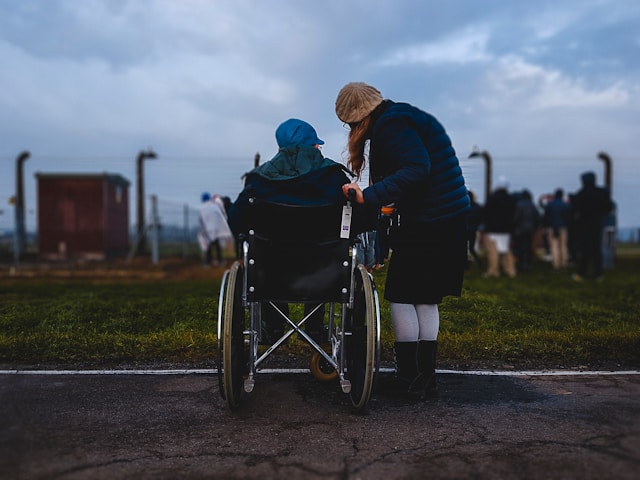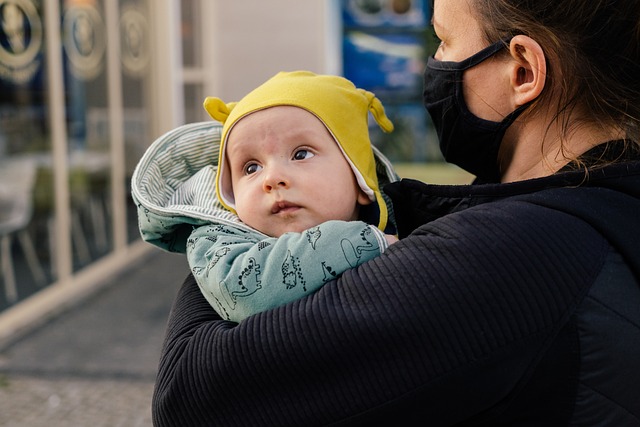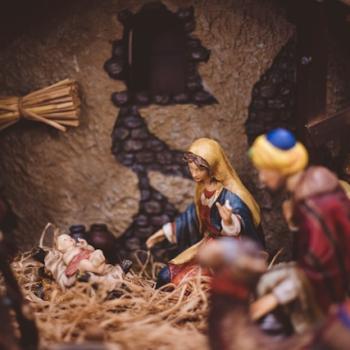
There are many different ways to serve God with our lives, and He calls us all differently. In the past few articles, I was able to highlight a few through stories like The Martian and 9. However, not all ministry is as highly praised and often spoken of in Christian circles as mission work and church work. Though even mission work and church work can be overlooked more often then I’d like. The ministry that is most often forgotten both by the church and the world is the one that is most often unseen. I’m speaking of Caregiving. In fact, caregivers are so commonly unseen and unsupported, they can develop traumatic responses from the weight of it. The burden of caregiving without community support is the center of Josh Mailerman’s Sci-Fi horror The Bird Box.
An Unwanted Burden.
Bird Box, like a lot of stories about caregivers, is focused on motherhood.
Our lead character, Malorie, realizes in the opening of the story, that she is pregnant through a one-night stand. The book is clear that Malorie’s feelings toward the pregnancy are, at best, conflicted.
The book features two timelines. One follows Malorie immediately after the outbreak of what seems like a virus. People, including Malorie’s own sister, begin committing suicide in horrific and violent ways. Some are actively attacking and killing other people.
Malorie manages to find safety with a group of people who have locked themselves in a home for safety They have discovered that the virus is actually a reaction to existential terror when a human being is exposed to some form of invading monster.
In this time line, Malorie is compared and contrasted to Olympia, another woman who is also pregnant. This woman, however, is delighted to be pregnant and excited about the prospect even in the midst of an apocalyptic event.
In the second timeline, we see Malorie and her now six-year-old children. There are two. We do get the indication at one point that one of these children belonged to Olympia. Malorie is now alone in the same home she once shared with multiple people, indicating something happened to one child’s parent.
Malorie is preparing to journey downriver to a place of safety promised by another survivor. We as the audience get to see her interactions with both children. Malorie loves them and is concerned about them. However, her love and concern come out in the form of strict training, anger, and punishment. She does not even give the children the privilege of having a name. They are known, respectively, as Boy and Girl.
The Horror of Caring
As the book unfolds, we see the tragedies and heartbreak that lead to the final events of The Bird Box happening. It is a science fiction horror with cosmic horror elements but it is mostly driven by social horror.
Malorie suffers many losses. She gains very little and when she does, it is taken away relatively quickly. As a woman forced to leave two newborns alone in all the dangers of the post-apocalyptic world, she has so much additional stress. As the children grow, she’s forced to discipline them harshly for small infractions. She’s forced to train natural things like joy and curiosity out of her young children. While she is out searching for food or other supplies, the children are often confined or locked up in ways we would think of as abusive.
This mother-tension is well exemplified by a single experience in the book. Malorie and the children are blind-folded, working their way down a swift river without the benefits of sight. There are countless dangers in that alone, but Malorie knows that there is a particularly large hurdle coming. The river splits before they reach their destination. She knows that she will need to have the benefit of sight to choose the correct direction and survive the rapids afterward.
She plans to decide which of the children will look. If she loses one of the children, one can still survive. If she sacrifices herself, both children will die. Eventually, she makes the excruciating choice to keep them all blindfolded and risk the rapids blind. While she and the children eventually reach the safety of a school for the blind, the threat is still constantly there. There is even an indication that Malorie may have to choose between blinding her children in the future, or risking their life if the monsters are able to break in.
The book does have a happy ending, though, with Malorie finally naming the children, indicating that she finally feels peace. The fear is still real, but the introduction of a community offers some stability and strength.
While Bird Box does an incredible job encapsulating the horrors of care-giving, it is not the only horror story that does so. Motherhood is most often centered in horror films such as The Babadook and Hereditary. Nannies and Au Pairs are highlighted such as in The Turn of the Screw and The Boy. The Front Room, a recent release from A24, features caregiving of an ailing parent. That is echoed in The Taking of Deborah Logan, and black and white horror Psycho. Even in the gothic horror The Haunting of Hill House the main character’s mental health was destroyed by caring for her ill mother. Many horror stories feature caregivers of disabled individuals or those with mental illness. The psychological thriller Shutter Island is one example. Health care workers, both good and evil, dominate body horror movies (most of which I don’t enjoy). Even wives, especially those trapped in a more “traditional” role, are often cast in a care-giving role in horror. The Sci-Fi horror, Foe, is an example, or The Stepford Wives.
Why is caregiving such a huge aspect of horror?
The Beauty and Horror of Dependency
What you might notice about these examples of caregivers in horror is that it goes in both directions. In The Bird Box we see the weight of the need placed on the care-giver, but also a bit of the vulnerability that makes the experience of a dependent so terrifying.
This is the key to what makes care-giving such a terrifying prospect. The dependant fears that they are being cared for by someone who is not trustworthy. When you do not have the ability to supply your own needs, trust is essential. A care-giver who openly abuses you is terrifying enough. But a caregiver who acts as though they love and care for you, but who only hurts you in the end, is far worse.
While pregnant, Malorie experiences some of this dependency. She depends on the people in the house to protect her while she goes through delivery, and while her body is compromised. When one of the house members turns against them and the others do not believe Malorie’s fears, she experiences some of that terror of the dependent.
These things are so scary to us because they are part of real life. Most of us may experience being a care-giver or a dependent for a season of life. For others, it is reality.
Caregiving is just as terrifying. It is truly terrifying to have someone depend on you for all their needs. What happens if you make a mistake? Caregivers often must be adept at multiple aspects of life. There are moms of handicapped children that would put doctors to shame. Many caregivers can make a dollar work harder for them than any financial advisor could. For most caregivers, these skills are nearly instantly in need.
Many caregivers don’t have the energy or ability to care for their own needs. We can all call to mind the image of a mother who makes sure their child brushes their teeth before bed but who hasn’t had a chance to shower since her baby threw up on her two days ago.
Most soberingly, caregivers are typically seen as ‘having it all together’. People may be willing to offer financial help or an occasional night of babysitting, but more is rarely given. Caregivers may feel scared of sharing their struggles for fear of sounding unloving or incapable. For some caregivers, they don’t have anyone who can offer them time to rest or take care of their own needs. The demand is too high. Prayers may be offered, but it’s rare to have someone offer practical help like a clean house, or dishes washed. Even when there are, caregivers may be afraid to ask for fear of being a burden or being judged.
Most caregivers feel forgotten and forever scared of being “found out.”

Sharing the Load.
It is terrifying to trust someone when you can’t take care of yourself. Willingly laying aside yourself to care for another is just as terrifying. Experiences like these are happening all around us every day. Caregivers come in many forms, both expected and not.
A dear friend of mine is not only a mother but a single mother of two children with developmental delays. She loves her children ferociously, like a mama bear. However, her children may hit, kick, or scream at her during meltdowns. She works through pain and sorrow even when rest is nearly impossible.
My Father patiently stood by my mother through a four-year journey with breast cancer. He picked up extra work around the house, took her to doctors appointments and evaluations, and focused on her needs to the point that after she passed he utterly collapsed and was barely able to care for himself.
Community members find it easier to offer support when there is a clear need with a beginning and end date. Most caretakers I know may get a rush of support around certain times when people remember them. Mother’s Day and Father’s Day often come with a rush of well-wishes and maybe a few small gifts. Whenever my Mother had a new diagnosis or hospitalization, the cards and donations would flood in.
Supporters are quick to forget caregivers when the immediate need is over. It’s understandable. I’ve been in both positions. When your own needs are constantly demanding your attention, its hard to remember the loneliness and sacrifice of another. A caregiver very quickly feels lost from view.
Many caregivers cannot regularly attend church or meet with their community. They are exhausted by the everyday day needs of those who’s lives are essentially in their hands and they struggle to ask for help. It often means being turned down several times before someone is available and able to help.
Caregivers need to be cared for. What should be an honor and a joy can quickly turn into a burden or even trauma when there is no one else to lean on. We see this in the book The Bird Box, where Malorie is able to relax and fully enjoy her children once she has a dependable community.
What are some ways the church can help? I think that looks different for every person. The first thing we need to do, however, is to listen.
When I was not struggling with my own chronic spiritual and mental health issues, I made it a point to offer childcare to couples in my church. They knew I was a child care provider, and often felt safe with me. That is often a challenge in and of itself. I tried to make it clear that I wanted to offer my services free of charge. Even if that sometimes meant I would go from working ten-hour days to nights with children and other people’s dishes. People still reach out to me and I hate when I need to say no.
When my own husband was suicidal and suffering from severe mental and physical health issues, having help was nearly impossible. It was more complex than just leaving him in someone else’s care. Having employers who understood if I needed to take a call or leave early was indispensable. My mom would often meet me on the way home from work, or even at my own home, to walk with me and talk with me. It relieved some of the fear of leaving my husband alone for long. I had friends I could call who had shared similar journeys and would offer loving advice.
It may be hard for caregivers to articulate what they need. Communities must be observant, but also willing to share their own experiences and how they could have been helped in the past.
God as the Caretaker:
The limits on Malorie in The Bird Box are clear. She is a resourceful and brave character, but she is not facing a simple situation. She is not just a mother. She also has to navigate a world of danger and darkness. Because of the situation she was in, she had to be superhuman to survive. This is true of most caregivers. Most feel like they must be superhuman to be successful.
There is one caregiver who is more than able. One of God’s names in Hebrew is Jehovah Jirah, which means God the Provider. His name is a prominent part of his character.
In Exodus, the Israelites complain about their lack of food and water, and God provides for them with quail, mana, and springs of water. (Exodus 16)
In 1 Kings 17, God acts through Elijah to provide endless bread and oil for a starving widow and her son.
The origin of the name Jehovah Jirah is in Genesis 22, when God acts to provide a sacrificial lamb in Isaac’s place when Abraham went up to sacrifice him. This, of course, points to God providing Christ himself to meet our needs in the gospels.
While we as humans will fail and struggle as dependents, caregivers, and communities, only God Himself can remove any horror from these experiences. Only he can be the perfect caregiver.
Join me Monday 11/11/2024 for a new type of article discussing the role of fiction in our world. This coming week I’ll be looking at the role of fiction in the elections.













